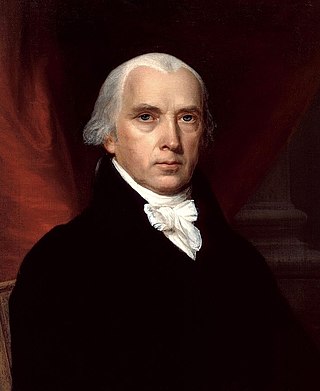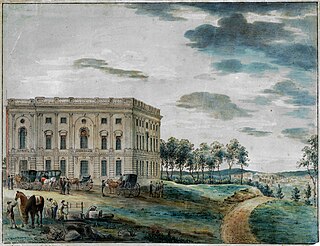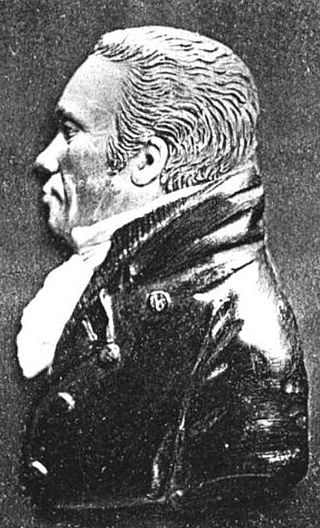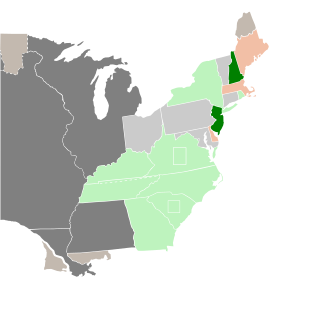
The 1796 United States presidential election was the third quadrennial presidential election of the United States. It was held from Friday, November 4 to Wednesday, December 7, 1796. It was the first contested American presidential election, the first presidential election in which political parties played a dominant role, and the only presidential election in which a president and vice president were elected from opposing tickets. Incumbent vice president John Adams of the Federalist Party defeated former secretary of state Thomas Jefferson of the Democratic-Republican Party.

The 1808 United States presidential election was the sixth quadrennial presidential election, held from Friday, November 4, to Wednesday, December 7, 1808. The Democratic-Republican candidate James Madison defeated Federalist candidate Charles Cotesworth Pinckney decisively.

The 10th United States Congress was a meeting of the legislative branch of the United States federal government, consisting of the Senate and the House of Representatives. It met in Washington, D.C., from March 4, 1807, to March 4, 1809, during the seventh and eighth years of Thomas Jefferson's presidency. The apportionment of seats in the House of Representatives was based on the 1800 census; both chambers had an overwhelming Democratic-Republican majority.

Christopher Gore was a prominent Massachusetts lawyer, Federalist politician, and U.S. diplomat. Born into a family divided by the American Revolution, Gore sided with the victorious Patriots, established a successful law practice in Boston, and built a fortune by purchasing Revolutionary government debts at a discount and receiving full value for them from the government.

The 1808–09 United States House of Representatives elections were held on various dates in various states between April 26, 1808, and May 5, 1809. Each state set its own date for its elections to the House of Representatives before the first session of the 11th United States Congress convened on May 22, 1809. They coincided with James Madison being elected as president. Elections were held for all 142 seats, representing 17 states.

James Lloyd was a merchant, businessman and Federalist party politician from Massachusetts during the early years of the United States. He twice served as United States Senator, notably succeeding John Quincy Adams after the latter lost the party vote due to his support of the Embargo Act of 1807.

Thomson Joseph Skinner was an American politician from Williamstown, Massachusetts. In addition to service as a militia officer during the American Revolution, he served as a county judge and sheriff, member of both houses of the Massachusetts legislature, U.S. Marshal, and member of the United States House of Representatives. He served for two years as Treasurer and Receiver-General of Massachusetts, and after his death an audit showed his accounts to be deficient for more than the value of his estate, which led to those who had posted bonds on his behalf having to pay the debt.

The 1803 United States Senate election in New York was held on February 1, 1803, by the New York State Legislature to elect a U.S. Senator to represent the State of New York in the United States Senate.

The 1809 United States Senate election in New York was held on February 7, 1809, by the New York State Legislature to elect a U.S. Senator to represent the State of New York in the United States Senate.

The 1804–05 United States Senate elections were held on various dates in various states. As these U.S. Senate elections were prior to the ratification of the Seventeenth Amendment in 1913, senators were chosen by state legislatures. Senators were elected over a wide range of time throughout 1804 and 1805, and a seat may have been filled months late or remained vacant due to legislative deadlock. In these elections, terms were up for the senators in Class 2.

The 1808–09 United States Senate elections were held on various dates in various states, coinciding with the 1808 presidential election. As these U.S. Senate elections were prior to the ratification of the Seventeenth Amendment in 1913, senators were chosen by state legislatures. Senators were elected over a wide range of time throughout 1808 and 1809, and a seat may have been filled months late or remained vacant due to legislative deadlock. In these elections, terms were up for the senators in Class 1.

The 1796–97 United States Senate elections were held on various dates in various states. As these U.S. Senate elections were prior to the ratification of the Seventeenth Amendment in 1913, senators were chosen by state legislatures. Senators were elected over a wide range of time throughout 1796 and 1797, and a seat may have been filled months late or remained vacant due to legislative deadlock. In these elections, terms were up for the senators in Class 1.

The 32nd New York State Legislature, consisting of the New York State Senate and the New York State Assembly, met from November 1, 1808, to March 30, 1809, during the second year of Daniel D. Tompkins's governorship, in Albany.

The 33rd New York State Legislature, consisting of the New York State Senate and the New York State Assembly, met from January 30 to April 6, 1810, during the third year of Daniel D. Tompkins's governorship, in Albany.

The 1822–23 United States Senate elections were held on various dates in various states. As these U.S. Senate elections were prior to the ratification of the Seventeenth Amendment in 1913, senators were chosen by state legislatures. Senators were elected over a wide range of time throughout 1822 and 1823, and a seat may have been filled months late or remained vacant due to legislative deadlock. In these elections, terms were up for the senators in Class 2.
The 1803 United States Senate election in Massachusetts was held in February 1803.
The 29th Massachusetts General Court, consisting of the Massachusetts Senate and the Massachusetts House of Representatives, met in 1808 and 1809 during the governorship of Levi Lincoln Sr. Harrison Gray Otis served as president of the Senate and Timothy Bigelow served as speaker of the House. In 1808, the state legislature elected James Lloyd as the Class 1 United States Senator from Massachusetts to succeed John Quincy Adams following his resignation on June 8, 1808.

American politician John Quincy Adams served as President of the United States (1825–1829) and United States Secretary of State (1817–1825). Prior to being president, he had served as United States Senator from Massachusetts (1803–1808) and had diplomatic experience as United States Minister to United Kingdom (1815–1817), Russia (1809–1814), Prussia (1797–1801) and the Netherlands (1794–1797). After losing the 1828 presidential election, he served as a member of the U.S. House of Representatives from Massachusetts for 17 years. He is the only American president to be elected to the House of Representatives after leaving office.

















